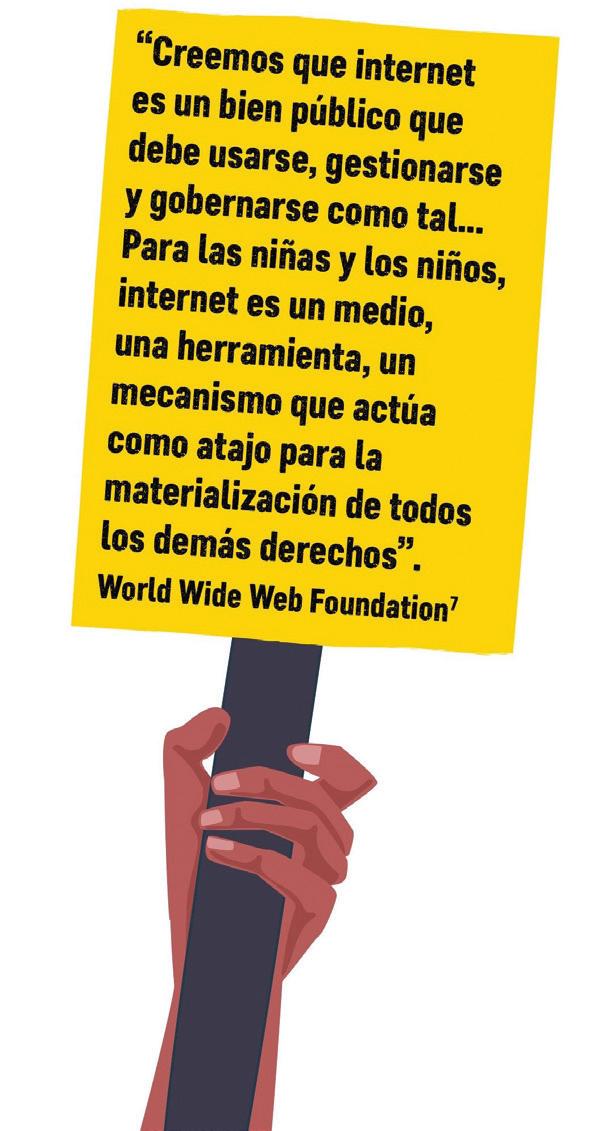
4 minute read
Tema de portada
...VIENE DE LA PÁGINA 8
y el bienestar de las mismas, como la baja de autoestima, estrés mental y emocional; además les causa problemas en sus relaciones interpersonales en sus espacios diarios, como la escuela.
Advertisement
En esta época los medios de comunicación tienden a alcanzar relevancia, principalmente las redes sociales, es importante que las niñas tengan acceso libre y seguro a estas formas de comunicación para que puedan expresar sus pensamientos e ideas, e incluso continuar con sus estudios en línea durante esta pandemia. En el último censo se registró que 7 de cada 10 guatemaltecos tienen acceso a internet, y 8 de cada 10 cuentan con computadora o teléfono inteligente. No obstante, el uso de estos aparatos tecnológicos aún no llega a la mayoría de niñas, (celulares, computadoras y otros dispositivos electrónicos) por diversas causas entre ellas: violencia basada en género, pobreza, exclusión, etc. Esto es verdaderamente preocupante ya que es un recurso muy valioso para su educación.
Es necesario resaltar que las niñas guatemaltecas que tienen acceso a la tecnología (mínima proporción) son víctimas de acoso y violencia. Según bullyingstatistics, 1 de cada 3 estudiantes guatemaltecas es víctima de acoso, la mitad de ellas admite que ha sufrido este problema y sólo un 10% de ellas llega a contárselo a un adulto. A raíz de
Imagen de RePoRte: ¿LIbRes PaRa estaR en Línea? exPeRIencIas de acoso en Línea de nIñas y mujeRes jóvenes” PoR PLan InteRnacIonaL. esta problemática y como parte de una campaña contra el problema, niñas y jóvenes de todo el mundo han escrito una carta abierta a Facebook, Instagram, TikTok y Twitter en la que les piden crear formas más fuertes y eficaces de denunciar el abuso y el acoso. Usted puede firmar y apoyar la carta en: https://

plan-international.org/es/firma-lacarta. Por su parte, Plan Internacional Guatemala está pidiendo al gobierno y entidades tomadores de decisiones que apliquen leyes específicas para hacer frente a la violencia de género en línea y garantice que las niñas que la sufren tengan acceso a la justicia.
Como se menciona en este mismo reporte, la libertad de expresión suele citarse como el criterio máximo en cuanto a cómo se regulan internet y las plataformas de medios sociales. Por lo general, nadie se responsabiliza por la información falsa, los abusos o el acoso que forman parte del entorno en línea. Los perpetradores, que fuera de internet se verían sujetos a las leyes, siguen en línea con impunidad y, generalmente, un anonimato que los empodera. La libertad puede ser un tema complicado: ¿los derechos de quiénes se priorizan y las voces de quiénes se silencian? Un sistema que fue diseñado para todas las personas, para conectarnos y brindarnos información, está en peligro de convertirse en una plataforma para quienes ya tienen poder y una fuerza que, en las palabras de Tim Berners-Lee, fundador de la red informática mundial, es ahora “antihumana”.
Para descargar el informe, visite: https:// plan-international.org/es/latin-america/ libres-para-estar-en-linea#downloadoptions
COVER STORY

...COMES FROM PAGE 9 girls who suffer from it problems with interperhave access to justice. sonal relationships in As is mentioned in the daily spaces like school. same report, freedom of expression is routinely In these times the means cited as the maximum of communication tend criteria in terms of how to be more important, the internet and social mainly social media. media platforms are It’s important that girls regulated. In general, have free and secure nobody is held responaccess to these forms of sible for false informacommunication so that tion, abuses and bullying they can express their that are part of the thoughts and ideas, online environment. and even continue their The perpetrators, who studies online during this pandemic. In the last census it was recorded Image FRom the buLLyIng oF gIRLs RePoRt: “FRee to be onLIne? exPeRIences and young women” by PLan InteRnatIonaL. oF onLIne outside the internet are subject to laws, remain online with impunity and, that 7 in 10 Guatemalans have internet access, and 8 in 10 have a computer or smartphone. However, the use of these technological devices (cellphones, computers and other electronic devices) still aren’t available to the majority of girls for various reasons, among them: gender-based violence, poverty, exclusion, etc. This is truly troubling since it’s a very valuable resource for their education. of bullying, half of whom admit that they’ve suffered from this problem and only 10% of them tell an adult about it. Because of this problem, and as part of a campaign against it, girls and young women from all over the world have written an open letter to Facebook, Instagram, TikTok and Twitter in which they ask them to create stronger and more effective ways to denounce abuse and bullying. You can sign and support generally, anonymity that empowers them. Liberty can be a complicated subject: who’s rights are prioritized? who’s voices are silenced? A system that was designed for everyone, to connect and provide information, is in danger of becoming a platform for those who already have power and a strength that, in the words of Tim Berners-Lee, founder of the world wide web, is now “anti-human”. It’s necessary to point out that Guatemalan girls who have access to technology (a minimal proportion) are victims of bullying and violence. According to bullyingstatistics, 1 in 3 Guatemalan students is the victim the letter on: https://plan-international. org/es/firma-la-carta. For their part, Plan International Guatemala is asking the government and decision-makers to apply specific laws to address gender violence online and to guarantee that To download the report, vist: https:// plan-international.org/es/latinamerica/libres-para-estar-enlinea#download-options







